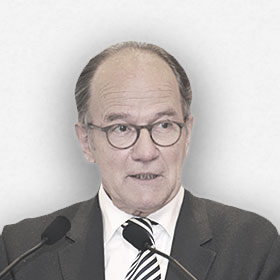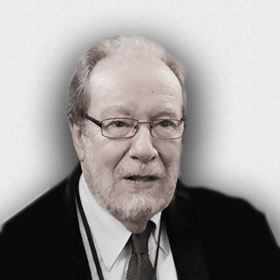Sidebar
Council Members
The Council of the International Criminal Bar (ICB) is committed to the respect for diversity, and comprises representatives from a wide range of cultures, races and religions.
There are a total of 42 Council Members from all of the continents, and hence each representing their distinctive legal systems. The term of service of each Council Member is 4 years, and all members meet twice a year.
The Council Members are responsible for electing the ICB's Executive Committee, and to put into practise the decisions adopted by the General Assembly of the ICB, as well as supervising the functioning of the Executive Committee.
All in all, according to the Statute of the ICB the legal rights of the entity correspond to the Council.
Former Presidents
- Elise Grouxl (Canada)
- Paul Albert Iweins (France)
- Jeroen Brower (Holland)
- Eberhard Kempf (Germany)
- Pascal Vanderveeren (France)
- Luis del Castillo (Spain)
REPRESETATIVES OF BARS AND LAW SOCIETIES
( 21; 5 from Europe,Africa;Asia and the Americas; 1 from Oceania)EUROPE
- Erika Torregrossa ( Bar de Barcelona )
- Francisco Javier La Pelaez ( Bar de Malaga )
- 3 seat being vacant
AFRICA
- 5 seat being vacant
ASIA
- Giles Surman ( Hong Kong Bar Association )
- Raymond Chedid ( Lebanese Bar Association )
- 3 seat being vacant
AMERICAS
- Alavaro Burgos ( Costa Rican Bar Association )
- 4 seats being vacant
OCEANIA
- 1 seats being vacant
INDIVIDUAL MEMBERS ( 14 )
- Pierre Kopps ( Israel ) LIST COUNSEL
- Ken Gallant ( EEUU ) LIST COUNSEL
- Dragos Chilea ( ROMANIA )
- Jaume Antich ( SPAIN )
- Nayma El Ouazani Sant ( ECUADOR )
- Juan Carlos Gutierrez ( VENEZUELA ) LIST COUNSEL
- Basmah Alsaif ( KUWAI )
- Elisabetta Galeazzi ( Italia ) LIST COUNSEL
- Samiha BELHAK KARIM (Marocco) LIST COUNSEL
- Mayombo KASSONGO (DR Congo) LIST COUNSEL
- Erika TORREGROSSA (Colombia)
- Nguyen DANG TRUNG (Vietnam)
- Abouba Aly Maïga ( Mali )
- Hossan Amin Eldeeb ( Egypt )
REPRESENTATIVES OF ASSOCIATIONS OF COUNSEL ( 7 )
- David Levy ( Conseil National de Barreaux )
- Blas Imbroda ( Consejo General de la Abogacia Española )
- Gian Domenico Caiazza ( Unione de la Camera Penali Italiana )
- Andres Guerrero ( Asociacion Juristas de Iberoamerica )
- 3 seats being vacant
REPRESENTATIVES OF ASSOCIATE MEMBERS ( 7 )
- Javier Garcia Mallol ( Asociacion Pro Derechos Humanos y Observatorio Criminal )
- Daniel Rezene Mekonnen ( Eritrean Law Society )
- Antonia Rocha ( Fondation Congolaise Pour la Promotion des Droits Humains et la Paix (FOCDP)
- 4 seats being vacant
History
The International Criminal Bar (ICB) was founded on June 15th 2002 at the Conference of Montreal. It held its first General Assembly in Berlin on March 21st and March 22nd 2003, which brought together over 400 people from over 50 countries. The members of the Council of the ICB ensure the best possible global representation having elected members present from the five continents with their respective legal systems.
The ICB brings together national and regional bar associations and other professional international bodies of jurists, all of whom are highly committed to the promotion of international criminal justice and the defense of the lawyers' interests worldwide. The ICB also contributes in the work of governmental and non-governmental organisations, and has assisted the creation and functioning of the International Criminal Court (ICC), as well as the practise of other international criminal courts and criminal programs in national jurisdictions.
The ICB has worked together with various governments to raise awareness on the need to implement an effective system of international criminal justice, and to assist implementing measures, all of which with the support of the international legal community and relevant institutions and players in this area.
The ICB has likewise stressed the necessity and advocated for the defense of the interests and protection of the victims and their defense lawyers, as well as defending the rights of criminal lawyers through our members and in the countries where we work.
ICB’s strong representation in the different legal systems increases every year and with each new member. After numerous efforts by members and partners, we are currently the international bar of lawyers with the largest territorial scope.
After more than 15 years working for fair international justice, we have the privilege to be currently collaborating with the ICC's ReVision Project, which is the first association involved. This project is ICB’s main area of concern, as well as to continue to provide an independent international criminal bar association to victims, members and those involved in international criminal proceedings, especially the proceedings in the ICC and other international courts.
Objectives
The International Criminal Bar (ICB) was founded on June 15th, 2002 at the Conference of Montreal, Canada. Its first General Assembly took place on the 21st and 22nd of March, 2003 in Berlin, Germany, with over 400 participants from over 50 countries.
Currently, the ICB is chaired by Mr. Dragos Chilea, and it brings together national and regional bar associations and the most important international bar associations, as well as lawyers deeply committed to promote international criminal justice.
The ICB is also enriched with the knowledge and experience of non-government organizations from 48 countries. The key objective of ICB and its members is to represent the legal profession at three levels:
- promoting the development of an independent legal profession and practice before the International Criminal Court;
- developing a criminal policy and promoting the core principles of justice;
- providing assistance to the lawyers who defend victims and defendants before the International Criminal Court, as well as facilitating an effective communication between the bodies of the Court and the lawyers.
The ICB’s geographical representation, which brings together people from different legal systems, is increasing with each new membership.
To become an ICB member means to be a part of an international legal community, representing your country within the international forum, increasing our visibility in the ICC, and to have access to an international professional network.
Moreover, by virtue of its knowledge and experience, ICB aims to assist its members in the administrative maze in which sometimes the international criminal justice system can become.
In order to ensure that lawyers’ specializing in this matter (international criminal justice) can receive special training to practice before the International Criminal Court, the ICB organizes training programs with free on-line courses, on specific and useful topics.
Both, courses and seminars have a common element: universal justice, and in particular, international criminal justice.
The ICB also arranges languages courses (English and French) for lawyers, taking into account that these are the official languages of the ICC.
For victims of human rights violations (genocide, crimes against humanity, war crimes, the crime of aggression), the ICB organizes seminars and conferences too.
We must highlight the fact that these training courses, seminars and conferences are free of charge, facilitating the access of participants to these programs.
Executive Committe
Executive Committe
The ExCo is the responsible for convening the meeting of the General Assembly, with the importance that this entails, it would have to promote the themes and decide whether the questions raised by individual members will be discussed in the General Assembly.
The Executive Committee shall be composed of seven members, taking the compulsory figures of President, Vice-President, Secretary and Treasurer.
In the Executive Committee also lies the power of attorney of the ICB, through three members acting at the same time.









